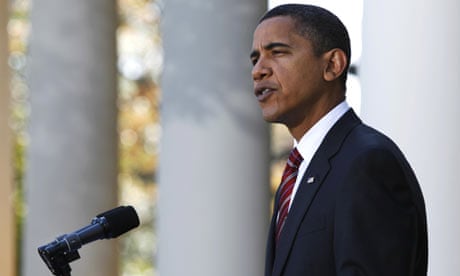President Barack Obama will travel to the climate summit in Copenhagen next month if the countries involved are on the verge of a deal and he thinks his presence will help to clinch agreement, he said in an interview last night.
It is Obama's strongest assertion yet that he will attend the meeting in Denmark to help secure a binding treaty in the fight against climate change, and comes after weeks of pessimism and a significant downgrading of the summit's goal.
"If I am confident that all the countries involved are bargaining in good faith and we are on the brink of a meaningful agreement and my presence in Copenhagen will make a difference in tipping us over edge, then certainly that's something that I will do," the US president told Reuters.
Obama made clear he considers his talks with Chinese leaders during an Asia tour later this month to be crucial in clearing remaining obstacles to an accord.
"The key now is for the United States and China, the two largest emitters, to come up with a framework that, along with other big emitters like the Europeans and those countries that are projected to be large emitters in the future, like India, can all buy into," he said. "I remain optimistic that between now and Copenhagen that we can arrive at that framework."
He spoke as progress on legislation in the US remains halting, and just days after the last formal international negotiations in Barcelona in the run up to the summit collapsed in acrimony. On Friday, developing countries threatened to walk out of the Copenhagen summit unless wealthier states commit to great cuts in their own emissions, and to more aid. Meanwhile, the UN, EU and some NGOs have accused the US of holding up the talks by refusing to show up at Copenhagen with firm emissions targets.
The US House of Representatives has passed a bill setting a 17% reduction in America's emissions from 2005 levels, and a version currently in the Senate aims for a 20% cut by 2020.
It became clear on Friday that the best hope for Copenhagen is a "politically binding" agreement, which rich countries hope will have all the key elements of the final deal, including specific targets and timetables for greenhouse gas emissions cuts and money for poor countries to cope with climate change.
A British government official said: "It would be substantive. It would set timelines, and provide the figures by which rich countries would reduce emissions, as well as the money that would be made available to developing countries to adapt to climate change." But, she said, a legally binding agreement "could take six months, up to a year, but we would want it to be [signed] as soon as possible."
If Obama shows up next month, he will join more than 40 heads of state and government, including prime minister Gordon Brown and others from Europe, Africa and South America who have said they will attend the talks.
In Washington, Republicans and some Democrats have resisted emissions legislation, saying it would hinder job growth as the country claws its way out of recession. The White House has said global climate negotiations should continue while the US domestic political debate plays out.
Republicans are little inclined to allow Obama a victory on climate change, which they see as a liberal issue in the US, and the entire Congress is embroiled in a bitter fight over his health care reform plans.
In a dramatic display of intransigence, Republicans on a Senate committee tasked with approving emissions control legislation boycotted a hearing last week on the bill. The bill passed and will now be further shaped by Senate Democratic leaders before a floor vote.
Complicating the situation are next year's congressional and Senate elections, when Democrats will be more concerned with voters' economic woes than with demands from Copenhagen participants.
On Monday, Obama said he was optimistic he could convince American businesses and the public of the "enormous amount of benefits" of emissions control.
"In meeting with world leaders, I've repeatedly explained that America is not a speedboat," he said. "We're a big ocean liner. And you can't reverse course overnight."
